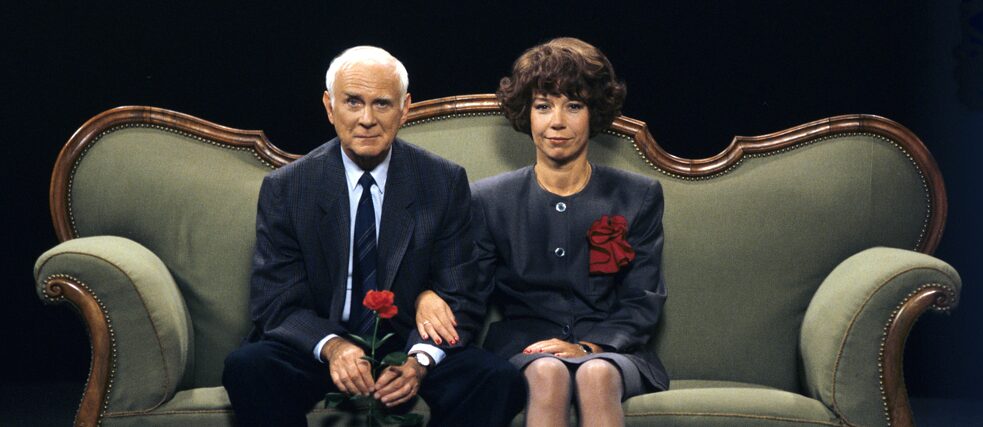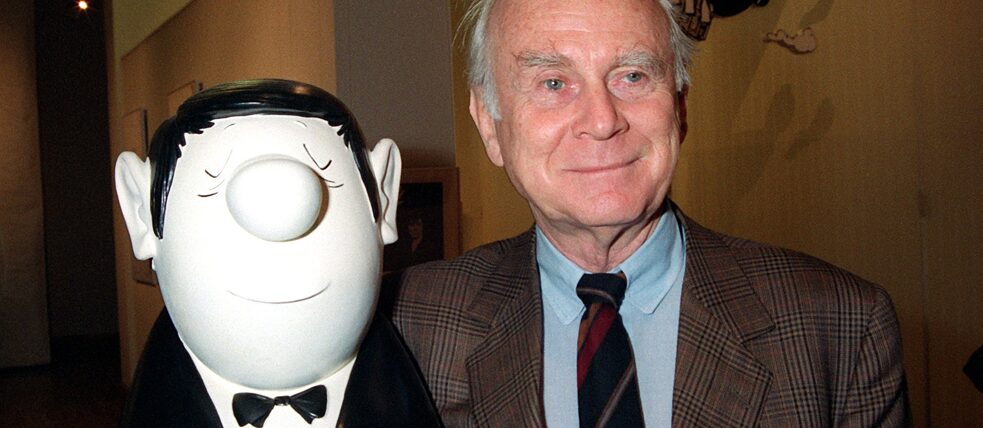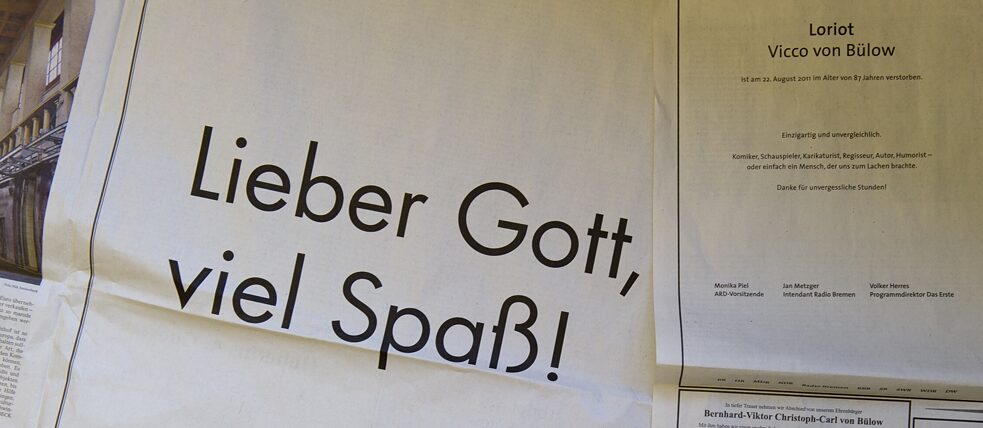100 Years of Loriot
There Used to Be More Tinsel

For decades, Vicco von Bülow – better known as Loriot – made people in Germany laugh, many quotes from his sketches becoming popular sayings. This year he would have turned 100.
“My name is Lohse, I am here to make some purchases.” More than three decades later, it’s hard to work out just why this statement entered common parlance in the late 1980s. What is clear is that for countless people in Germany it was and remains to this day both a witty saying and a badge signalling that one was part of a humorous community of Loriot fans. The words were penned by Vicco von Bülow, better known by his stage name, Loriot: the man who was always able to make his audiences break out in unfathomable laughter.
“Ach Was!”
And yet his success has not been unfathomable at any point. Loriot did not always need a fully articulated let alone convoluted sentence to cause his audience to end up in fits of laughter. All that was required was a well-timed “Ach!” (roughly equivalent to “Oh!”) or “Ach?” (“Oh?”) to expose the absurdity of the most innocent everyday situation. “Ach was!” (meaning something along the lines of “You don’t say!” or “Come off it!”). Well, perhaps the scenes depicted weren’t always entirely everyday. “Aha!” (this has much the same meaning as in English).
Daily life nonetheless shimmered through in every one of Loriot’s sketches, enabling a wide audience to share his humour. “No, absolutely not!” But yes! Even when two gentlemen are to be seen sitting in a bathtub, arguing about whether a rubber duck should be allowed into the water or not, some semblance of everyday life can still be observed, breaking with the absurdity of the situation and seemingly restoring normality. “Yes yes …”
 “My name is Lohse, I am here to make some purchases” – and specifically, far too much of everything. The quotes from “Pappa ante Portas” about Heinrich Lohse, a purchasing manager who found it hard to adjust to retirement, still have people in fits of laughter to this day.
| Photo (detail): © picture alliance/United Archives/IFTN
“My name is Lohse, I am here to make some purchases” – and specifically, far too much of everything. The quotes from “Pappa ante Portas” about Heinrich Lohse, a purchasing manager who found it hard to adjust to retirement, still have people in fits of laughter to this day.
| Photo (detail): © picture alliance/United Archives/IFTN
“There Used to Be More Tinsel”
Had he not died in 2011, Vicco von Bülow would no doubt still be drawing his cartoons to counter the boredom of daily life and jotting down the amusing hiccups that dog the middle classes, though this year would have seen him turn 100. After all, the humourist had already turned his back on both the big and the small screen in 2006, lamenting in Germany’s weekly magazine Der Spiegel that the format had become so fast-paced that “simply no comedic quality” could be achieved any longer.
And yet Loriot’s oeuvre is noticeably more subversive than that of his humorous contemporaries. As they rejoiced in the emerging economic miracle, the inhabitants of post-war Germany preferred to laugh at blandly jolly and innocuous jokes. Whatever happens, don’t question the accomplishments of the early years after the war – that was the order of the day. And the bright and cheerful comedy of protagonists like Heinz Erhardt was just the thing to avoid any scrutiny of the past, however necessary this may have been.
 Besides his sketches and films, his characters have not been forgotten either. One legendary cartoon sketch is entitled “Herren im Bad” (Gentlemen in the bathroom) and features Mr Müller-Lüdenscheidt und Dr Klöbner, both of whom have bulbous noses.
| Photo (detail): © picture-alliance/ZB/Karlheinz Schindler
Besides his sketches and films, his characters have not been forgotten either. One legendary cartoon sketch is entitled “Herren im Bad” (Gentlemen in the bathroom) and features Mr Müller-Lüdenscheidt und Dr Klöbner, both of whom have bulbous noses.
| Photo (detail): © picture-alliance/ZB/Karlheinz Schindler
“The World Is Coming to an End but We Have Mustard, Scrubbing Brushes and Bath Additives”
So it’s just as well that Loriot entered the scene, whose first cartoon series in 1953 Auf den Hund gekommen (i.e. Gone to the dogs) in the weekly magazine Stern demanded that the reader embrace irony and self-reflection and, in so doing, even managed to upset the then editor-in-chief Henri Nannen. Allegedly, Nannen sacked the young illustrator with the words: “I never want to see that fellow at the Stern again!”. Nonetheless, the dog stories were to be reprinted several times and translated into three foreign languages over the following years.
Vicco von Bülow, who had studied painting and drawing after the war, never in fact returned to the Stern, yet his trademark drawing, a little man with a bulbous nose, striped trousers and a bowler hat on his head, remained his constant companion from that time on. And everyone wanted to see him: thanks among other things to appearances in adverts, not only the advertised products themselves and the little man with the bulbous nose, but also Loriot himself became extremely well known.
 So legendary that all kinds of different versions of the rubber duck that is the bone of contention between the two gentlemen have found their way onto Loriot’s grave.
| Photo (detail): © picture alliance/imageBROKER/Schoening Berlin
So legendary that all kinds of different versions of the rubber duck that is the bone of contention between the two gentlemen have found their way onto Loriot’s grave.
| Photo (detail): © picture alliance/imageBROKER/Schoening Berlin
“The Duck Is not Coming In!”
Wherever this characteristic figure was spotted, audiences knew that they were in for some “Loriot”-quality comedy. Which presumably also means that Loriot had no small influence on the development of West Germany’s magazine industry – and possibly even helped shape the 1968 movement?
One thing is certain: in 1962, the cover of the first edition of the satirical magazine Pardon featured Loriot’s little man with the bulbous nose, who was holding a bouquet of flowers out to the audience, complete with a bomb whose fuse was already lit. This cover came across in just the same way as all of Loriot’s humour: its language elegantly bound, just like the flowers in the bouquet, but full of explosive punchlines – and with all the devastating potential of a bomb, if necessary. Though Loriot did not go on to illustrate any other Pardon covers, the magazine consequently evolved to become a place where the 1968 movement could find reassurance and confirmation of its own image and perception of itself and, at the peak of the protests in 1968, was read by hundreds of thousands of people.
Was the middle-class Vicco von Bülow perhaps an influential figure in the 1968 movement? That may indeed be going a bit too far. All the same, he does stand for a tradition of comedy in Germany that bravely entered the terrain of unfathomable laughter and inexplicable absurdities. Initially in Pardon magazine. And later in Titanic magazine, which exists to this day. Loriot and the little man with the bulbous nose certainly served as prominent inspiration for this brand of comedy and this type of laughter.
 The Art Directors Club Germany, of which Loriot was an honorary member, devoted a full-page obituary to him – it reads “Dear God, have fun!”
| Photo (detail): © picture alliance/dpa/Peter Kneffel
The Art Directors Club Germany, of which Loriot was an honorary member, devoted a full-page obituary to him – it reads “Dear God, have fun!”
| Photo (detail): © picture alliance/dpa/Peter Kneffel
Comments
Comment